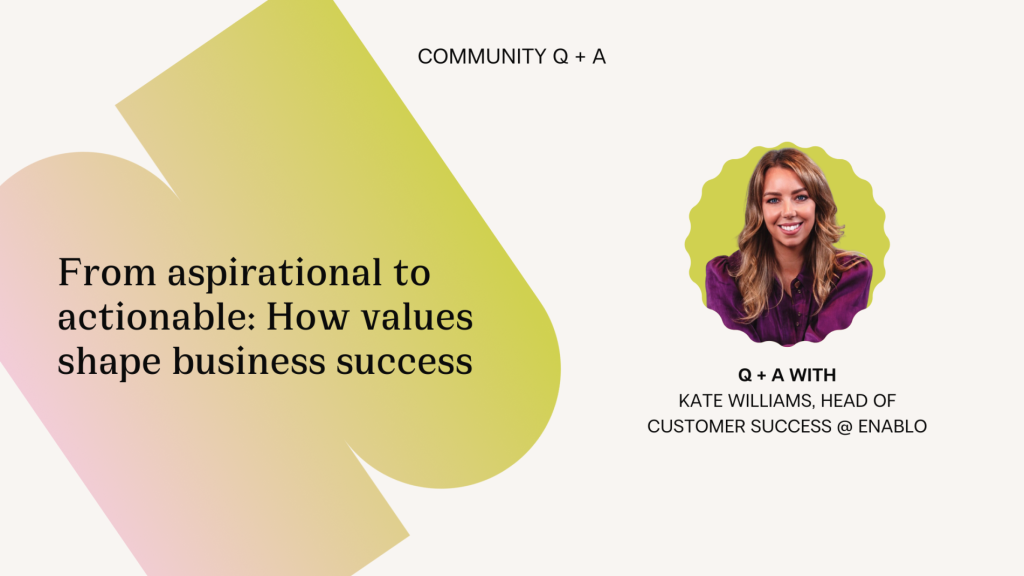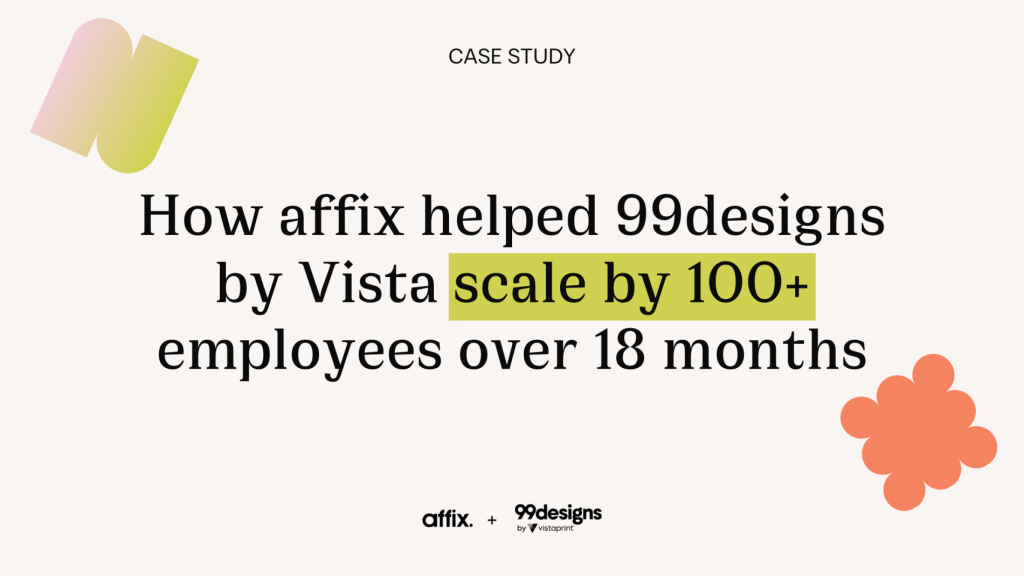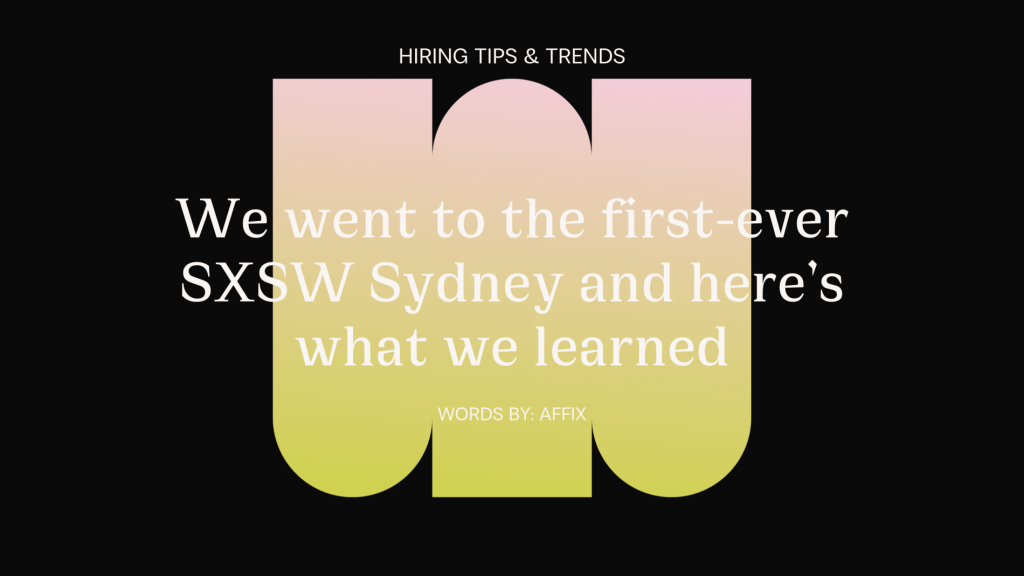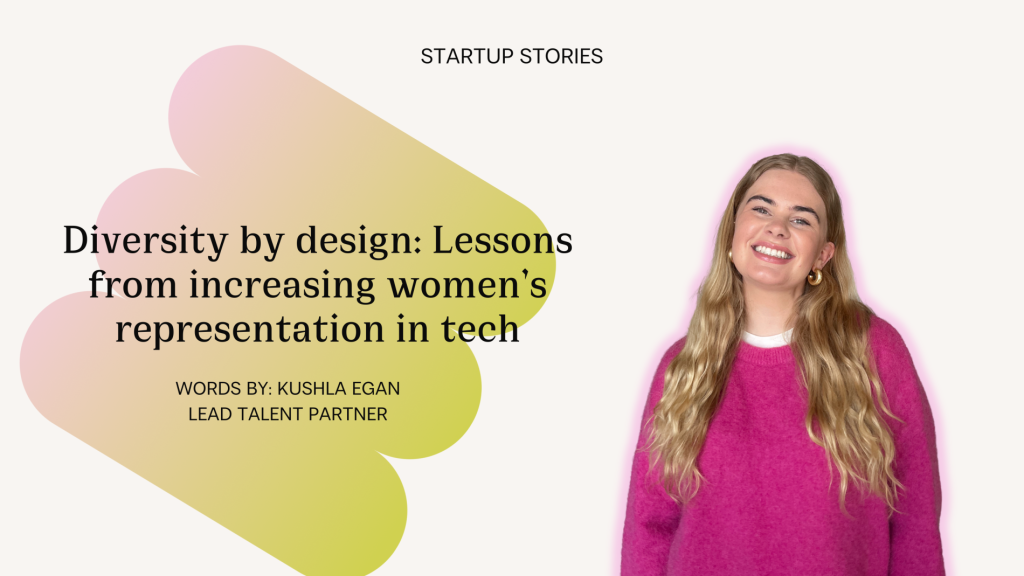From Aspirational to Actionable: How Values Shape Business Success

It’s no secret that an authentic commitment to purpose and people will yield better business performance over time. That’s why it’s pivotal for leaders to authentically live their company’s values daily through their words, decisions, and actions. Not only does it positively impact customers and employees, but also helps businesses attract and retain top talent.
We sat down with the wonderful Kate Williams, Head of Customer Success at Enablo, to discuss the role values play in her day-to-day. She translates her passion for living and breathing Enablo’s values into tangible benefits that her team and customers reap.
Kate also shares tips and advice on how business leaders can think about company values differently so that everyone gets the most out of them. Let’s get into it!
Tell us about your role at Enablo and how company values influence or shape what you do.
As the Head of Customer Success, I lead my team in creating deep, meaningful relationships with our customers, so they get the best possible experience when partnering with us.
Values are everything to us. Our team is passionate about delivering the best employee experience, so it’s important for us to ‘walk the talk’ on a daily basis.
Being a Workplace from Meta partner, we’re always anticipating our customer’s needs, wants, and challenges, so acting in their best interest through every touchpoint is one way we live our value of ‘Being human centric’.
At the end of the day, you can have all the structure and strategy in place, but what really matters is how your customers feel when they’re working with you and how you’re creating a values-based outcome for them.
How do you make company values part of your team’s day-to-day?
From micro-decisions to personal and professional development planning, values are core to everything we do.
For example, all of my team members have a combination of performance-based and values-based goals that we consistently review in our weekly conversations. Not only are they measured on the performance of their role, but they’re also held accountable to our values.
We review how they’re collaborating with other teams in the business, how they’re contributing to new ideas while being open and vulnerable, how they’re creating ‘fun’ and a sense of community with those around them, and how they mentor and find ways to share their unique expertise.
Too often I’ve seen individuals celebrated for their performance from a ‘work’ perspective even though they’re not showing up from a values perspective. Sometimes we even celebrate people who are having a negative impact on culture and our teams, which is why striking that balance is so important to me.
What observations have you made about company values in the recent years?
More than ever, it seems like we’re all striving for more authenticity when it comes to branding and company values. Don’t bother creating values that just look good ‘on a wall’. Instead, put thought into who your people are, what they do, how you make your customers feel and what it’s like to work there.
Say one of your brand values is ‘Transparency’.
Consider the following questions:
- How are your leaders being transparent on a daily basis?
- Are you having confidential meetings without your teams?
- Are you looping your teams in when you’re making decisions, sharing how and why you’re making them?
- In times of crisis, are you hiding behind an internal comms team or your EAs, or are you actually speaking from the heart and telling the truth?
Of course, it’s important to exercise discretion around more sensitive topics, but there are heaps of ways the value of ‘Transparency’ can come into play in the details and the day-to-day.
Have you ever worked for a business whose values you didn’t connect with?
I’ve been really lucky to work with great organisations throughout my career. But it’s because I’ve always focussed on choosing roles and organisations that are purpose-driven, people-first and customer-centric.
For me, it’s important that the product also lives and breathes those values. It’s why I keep coming back to the tech industry, because I love having the opportunity to be futuristic and spend time ‘dreaming big’.
Why are values an important tool in business? Why do they even matter?
Values set the tone for behaviours, micro and macro decision-making and tell your people what’s acceptable and what’s not. It should be the ‘north star’ for everything you do as an organisation, giving people a consistent framework for doing the right thing.
Without that, you’re going to lose your people pretty quickly as seen via staff turnover, lack of employee engagement, and poor culture. I believe the companies with good, strong, and front-of-mind values will always out-perform those who whack them on a wall and hope for the best.
It’s a no-brainer.
How can businesses measure the success of their company values?
There are a few key things to assess whether or not your company values are resonating with your people and being lived in the day-to-day. ‘Culture’ can be difficult to measure, but employee engagement and staff retention rates are easy to measure once you have the right platform and the right insights.
How do you ensure that your company values are not just a marketing tool, but are actually integrated into every aspect of your business operations, including the hiring process?
It starts in the creation process. Many companies, especially start-ups, enlist their marketing team to go and “create the values”. This misses a critical step – bringing their people on the journey!
Without that, the folks tasked with values development come back with a series of words that may align with the brand, but don’t actually resonate with the culture or sense of community and belonging that employees feel when they come to work. Simply because they haven’t been asked!
From the beginning, get direct input from the people who actually do the doing. Do a poll, send an anonymous survey, or best of all, have conversations with people face-to-face. Whatever it is, consult your people.
Then, look for ways to execute your values. Consider:
- How can our (customer and employee) onboarding be a reflection of our values?
- How can we weave values into our formal and informal reward & recognition activities?
How do we ensure our leaders talk about our values in your organisation-wide meetings, in explaining decision making, company celebrations and more?
Any final thoughts, advice, or resources you’d like to share?
I believe that the best leaders for incoming generations into the workforce like Gen Z and beyond will require much more people and values-based skills. That’s not to say that strategy isn’t important, but I am a big believer that culture eats strategy for breakfast.
To actually engage your people, you have to invest deeply in their experience and take the time to understand their needs and wants, and adapt to those as a leader. That’s how we’re going to attract and retain the best talent into the future, and truly set our teams and businesses apart from the rest.
About Enablo:
Enablo is digitising the world of work and enabling new work experiences that are accessible to everyone, anywhere. Through their partnerships with Workplace from Meta, Microsoft Viva Engage, Talespin and Google Workspace, they’ve helped hundreds of organisations transform their culture and the way they work.
Enablo Company Values:
- Solving big problems
- Being human centric
- Having fun
- Collaboration
- Diversity


